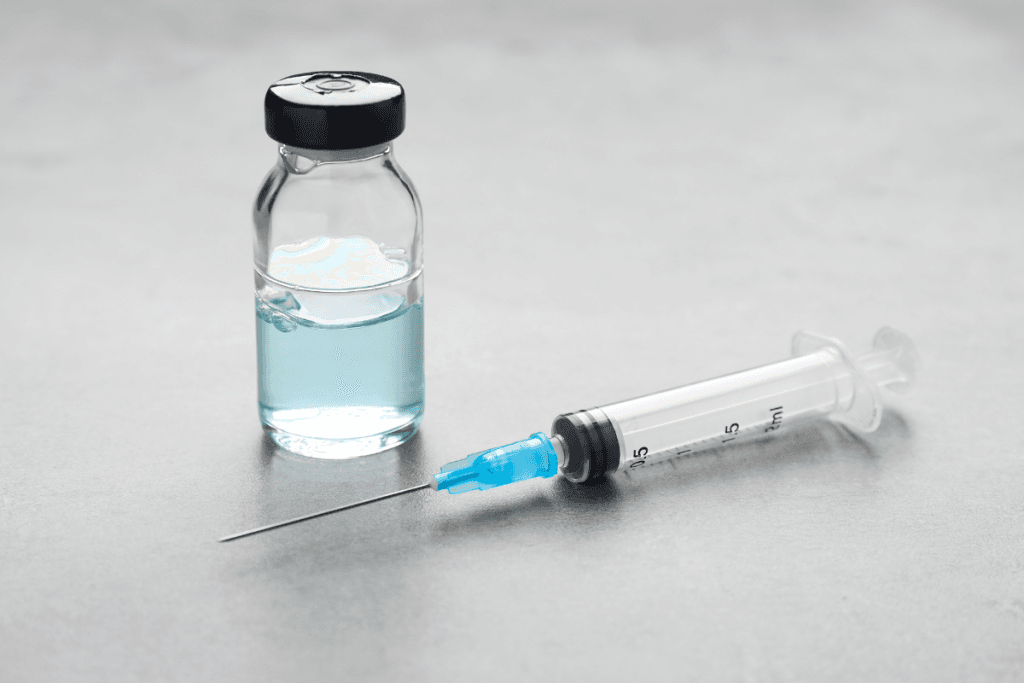Depo-Provera (medroxyprogesterone acetate) is a long-acting progestin contraceptive used in many clinics. When a program adds the depo provera injection, the operational details matter as much as the clinical ones. Site technique, interval tracking, and documentation help reduce avoidable errors. So does setting expectations around bleeding changes and delayed return to fertility. This briefing focuses on long-term use considerations, common side effects, and what clinics should prepare for.
Key Takeaways
- Standardize screening and documentation for contraindications and follow-up.
- Expect variable bleeding patterns; plan consistent counseling language.
- Use clear IM technique and site selection to reduce site pain.
- Address long-term risks, including bone health, using authoritative guidance.
- Build a repeat-visit workflow to prevent late or missed doses.
MedWholesaleSupplies serves verified clinics and healthcare professionals, not direct-to-consumer purchasers.
depo provera injection in Clinic Practice
This method is an injectable progestin used for pregnancy prevention. It is typically administered intramuscularly (IM) in clinic settings, with repeat dosing scheduled at regular intervals per the official labeling and local protocols. It can be a good operational fit when adherence to daily pills is difficult, privacy is a concern, or a patient prefers an office-based method.
From a program-design view, success depends on two things. First, visit timing needs reliable reminders and rescheduling pathways. Second, your team needs consistent education points on expected bleeding changes and when follow-up is needed. For a deeper refresher on basics and typical use patterns, see Depo-Provera Usage Guidelines.
What “effectiveness” means operationally
Searches for depo-provera effectiveness and depo-provera effectiveness time often reflect an operational reality: effectiveness depends on correct initiation timing and on-time repeat administration. Clinics can reduce failures by documenting the administration date, defining a scheduling window in policy, and training staff to manage late or missed appointments consistently. Patient-level counseling and pregnancy testing decisions are clinical and should follow your medical director’s protocol and current guidelines.
Indications and contraindications to capture consistently
Teams may see the phrase depo-provera indications in referral notes or templates. Indications are generally related to contraception, but medroxyprogesterone products exist for other uses and strengths, so verify the exact formulation and labeled use you stock. Contraindications and precautions should be screened and documented before administration. Many clinics align screening with CDC eligibility guidance and the product’s prescribing information.
Why it matters: A standardized screen reduces variability across clinicians and shifts.
Safety and Tolerability: What to Track Over Time
Most clinics field questions about depo-provera side effects early in therapy. Bleeding pattern changes are common and can drive discontinuation if expectations are not set. Other commonly reported effects can include weight change, headache, breast tenderness, and mood changes. Individual experience varies. A structured follow-up script helps your team document what changed, when it started, and whether other causes need evaluation.
When discussing depo provera injection with patients, avoid overpromising predictability. Focus on what you can track: bleeding days, severity, and impact on daily function. Use consistent language for “spotting,” “irregular bleeding,” and “amenorrhea” (no menstrual bleeding). This improves continuity when different clinicians see the same patient.
Side effects after stopping and transition planning
Depo-provera side effects after stopping are a frequent concern during method transitions. Cycles may take time to normalize, and some patients report temporary bleeding irregularity as the medication effect wanes. Return to fertility can be delayed compared with short-acting methods, and that expectation should be framed neutrally and documented. If your clinic transitions patients to other long-acting options, it helps to standardize handoffs and counseling points across modalities.
Common pitfalls
- Vague bleeding history + no baseline documentation.
- No plan for missed appointments or late reinjection.
- Under-triaging pelvic pain or heavy bleeding complaints.
- Mixing up formulations or strengths during stocking.
What happens if pregnancy is suspected or confirmed
Queries like what happens if you get pregnant on depo-provera often come from triage staff and scheduling teams. Pregnancy during use is uncommon when administration is on schedule, but it can occur. Your role is to have a clear escalation pathway: timely clinical assessment, medication exposure documentation, and consistent messaging. Evaluation steps depend on symptoms, timing, and clinician judgment, and should follow your clinic protocol and the prescribing information.
If pregnancy is confirmed, document lot/expiry details from the administered product, administration date, and any symptoms prompting evaluation. Also ensure the patient’s problem list and medication list are updated so downstream clinicians see the exposure history. For broader context on injectable contraception considerations, see Hormonal Injection Overview.
Administration Essentials: IM Sites, Needle Size, and Comfort
Before administering a depo provera injection, align your process across ordering, preparation, and documentation. Clinics commonly use a prefilled syringe presentation for IM use, but local practice may differ. Use only the product and route specified in the prescribing information. Avoid “workarounds” that bypass labeling, pharmacy policy, or nursing scope in your state.
Many staff questions cluster around depo-provera dosage and administration, especially for float nurses or new hires. Consider a one-page internal standard that covers: allowed route(s), required checks, where documentation lives in the EHR, and how follow-up is scheduled. Link that standard to competency training and annual refreshers.
Inventory is typically sourced through distributor partners that undergo qualification and vetting.
Injection site selection: gluteal vs deltoid
Search terms like depo-provera injection site, depo-provera injection site gluteal, and depo-provera injection site deltoid reflect real practice variation. Your clinic should choose sites that match labeling and staff competency, then standardize technique. For IM injections, depth matters. Body habitus can influence whether the intended muscle is reached. That is why teams also ask about depo-provera injection needle size and depo-provera weight limit. There is not a practical “weight limit” in most policies, but there is a technique requirement: select needle length based on site and patient characteristics, using clinic protocol and manufacturer guidance.
Depo-provera injection site pain can be reduced with consistent steps. Use calm positioning, allow antiseptic to dry, and avoid rapid, forceful technique. Document the site used (including laterality when applicable), any immediate reaction, and patient tolerance. If you need a visual reminder for device handling and components, your supply team may reference the Depo-Provera 150 mg Syringe listing when reconciling stock and training materials.
Long-Term Use Planning: Bone Health and Follow-Up Planning
Long duration is part of the appeal, but it also raises monitoring questions. Depo-provera side effects long-term discussions often focus on bone mineral density (BMD) changes and whether duration should be limited. The reality is nuanced. Risk varies by patient age, baseline bone health, and competing pregnancy risks. Clinics should align their approach with the product labeling, national guidance, and the patient’s broader risk profile.
Long-term planning for depo provera injection works best when it is explicit. Build a “continue vs switch” discussion into annual preventive visits or contraception reviews. Document the rationale for continued use, what alternatives were reviewed, and what follow-up is planned. This is especially important in populations where baseline bone health concerns are more likely.
Age and duration conversations without rigid cutoffs
Patients and staff may ask about a depo-provera age limit. Some concerns relate to adolescent bone accrual, while others relate to perimenopause and changing bleeding patterns. Rather than quoting a universal cutoff, many clinics document individualized counseling anchored to guideline language. If your state or organization has specific consent language, ensure it appears in patient materials and is refreshed when labeling or guidance changes.
There are also occasional questions about depo-provera banned status due to media coverage, litigation, or country-specific policy changes. In most U.S. contexts, it remains an approved prescription product, but policies can vary by jurisdiction and institution. Keep a habit of checking authoritative updates annually and routing media-driven questions to a clinician with a standard script.
Quick tip: Add a yearly contraception review note template to reduce charting variability.
How to Compare With IUDs and Implants in Your Program
Method choice is not only clinical. It is also operational: training, visit length, inventory, and follow-up cadence. When comparing depo provera injection to implants and intrauterine devices (IUDs), consider which parts of care happen on the day of placement and which parts happen later. An injection program tends to create repeat touchpoints. Implants and IUDs shift more work to the insertion visit, then require fewer routine returns.
Some clinics keep multiple LARC options available to match patient preferences and contraindications. For example, teams may stock an implant and one or more levonorgestrel IUDs. If your staff needs a quick internal primer, you can cross-reference Nexplanon Implant Overview alongside your own credentialing and insertion policies. Inventory teams may also maintain separate stocking references for Mirena 52 mg IUD and a smaller-dose option such as Jaydess 13.5 mg IUD, depending on formulary and clinician preference.
How to compare: practical decision factors
- Visit cadence: repeat injections vs single placement visit.
- Reversibility: expected time to fertility return varies.
- Bleeding profile: anticipate irregularity with progestin methods.
- Procedure needs: insertion skills, setup, and emergency readiness.
- Inventory burden: cold chain needs, expiries, and wastage risk.
For non-hormonal options, some programs also stock copper IUDs and related insertion supplies. If your supply closet supports that pathway, browse your Gynecology Tools hub for commonly paired items and ensure your clinical policy covers device tracking and consent documentation. A copper option reference point is the T-Safe Cu 380A IUD listing used by some teams when reconciling SKUs.
Emergency contraception questions sometimes arise after late injections or gaps in coverage. Your front desk and triage scripts should route these scenarios to clinicians. For staff education that helps compare options without replacing clinical judgment, see Emergency Contraceptive Comparisons.
Clinic Operations Checklist: Documentation, Storage, and Sourcing
Stocking a depo provera injection requires more than a purchase order. You need a repeatable chain of custody, clear documentation, and a defined storage process that matches labeling. Policies vary by state and accreditor, so keep your checklist general and auditable. If you operate across multiple sites, standardize naming in the EHR so records are comparable and searchable.
MedWholesaleSupplies focuses on authentic, brand-name products for licensed clinical use.
Clinic workflow snapshot (high level)
- Verify: patient eligibility pathway and clinician order.
- Document: screening, consent, and counseling notes.
- Procure: match NDC/SKU, strength, and labeled route.
- Receive: log lot number and expiration date.
- Store: follow labeled temperature and light guidance.
- Administer: record site, route, and patient tolerance.
- Record: schedule next window and update medication list.
Include a standing process for adverse event reporting and product complaints. Keep lot and expiration data easy to retrieve. This becomes critical during recalls or when investigating unexpected reactions. If you manage multi-state programs, confirm that your supplier supports compliant documentation for credentialed accounts and that your internal policy reflects those requirements.
For some practices, reliable US logistics supports predictable inventory rotation and fewer stockouts.
Operations checklist (printable)
- Formulation verified + route matched.
- Lot/expiry captured at receipt.
- Storage conditions logged daily.
- Administration note template standardized.
- Late/missed visit pathway defined.
- Incident reporting process assigned.
- Inventory reconciliation scheduled monthly.
If your program also offers implants, keep separate competencies for injection administration vs insertion and removal. Your inventory team may track implant and injection stock differently due to packaging and access controls. A product reference used by some stock managers is Nexplanon 68 mg Implant, alongside your internal par-level rules.
Authoritative Sources
- CDC: U.S. Medical Eligibility Criteria for Contraceptive Use (US MEC)
- ACOG: Depot Medroxyprogesterone Acetate and Bone Effects
Further reading can help align counseling scripts, consent language, and follow-up intervals with current guidance and your local policies.
This content is for informational purposes only and is not a substitute for professional medical advice.






